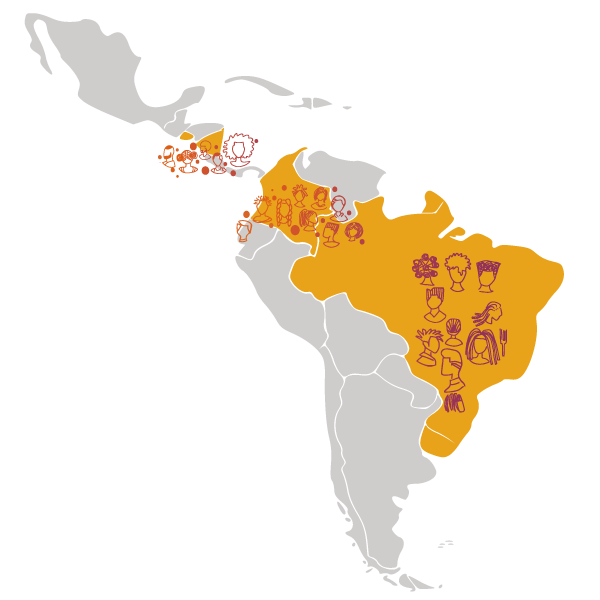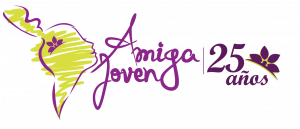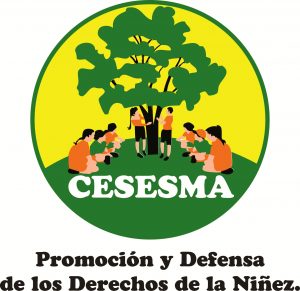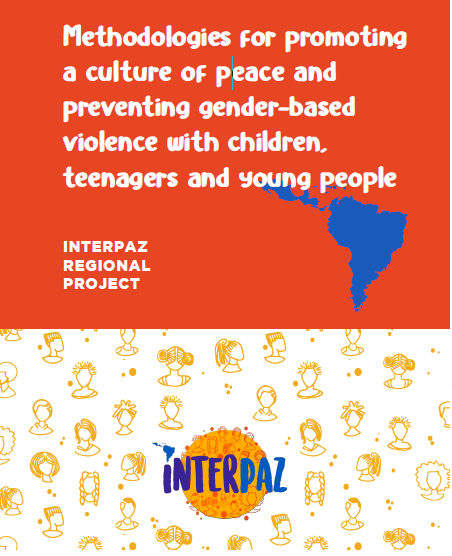Publications

The Interpaz Regional Project worked together with children, adolescents, and young people to promote a culture of peace and gender equality in four Latin American countries, in partnership with the organizations Ação Educativa (Brazil), Corporación Amiga Joven (Colombia), Museo de la Palabra y la Imagen (El Salvador), Centro de Servicios Educativos en Salud y Medio Ambiente – Cesesma (Nicaragua), and terre des hommes Germany, responsible for general project coordination and co-financing alongside the Federal Ministry of Economic Cooperation and Development of Germany (BMZ).
The activities held by Interpaz between 2019 and 2023 relied on approximately 1,000 active participants, among them children, adolescents, youths, and adults. These initiatives sought to disseminate practices and methodologies aimed at non-violent conflict resolution, respect for diversities, encouraging dialogue, and breaking from gender stereotypes and cultural roles that normalize various forms of violence, especially against girls and women. For this purpose, Interpaz:
The four partner organizations of the Interpaz Regional Project are based in different countries that possess social and cultural peculiarities, but hold many aspects in common, among those the history of armed conflicts and authoritarian political regimes, the high levels of violence, and the profound economic and social inequalities that affect mainly women and LGBTQI+ people; children, teenagers, and young people; black and indigenous populations; persons with disabilities; among other groups.
These are contexts marked by alarming rates of gender-based violence and femicide, in addition to violence perpetrated against children and youth.

The organization Ação Educativa has been actively engaged, since 1994, in the defense of educational, cultural, and youth rights, with the goal of promoting democracy, social justice, and socio-environmental sustainability.
SAFE SPACES FOR DIALOGUE
At Interpaz, Ação Educativa implemented the Street Football methodology (or Fútbol Callejero, as it is known in Spanish in other countries), which uses sport as a tool for conflict mediation, community organization, and the promotion of a culture of peace and gender equality. Street Football is played with mixed teams (women and men), and its rules are defined collectively and are based on three core values: cooperation, solidarity, and respect. Whichever team adheres most to the rules, wins the match. There are no referees: mediators assist and work together with the entire group in order to reach a consensus.
Since 2015, the organization, supported by terre des hommes Germany, has maintained the Rede Paulista de Futebol de Rua [São Paulo Street Football Network], which encompasses 17 centers in the city of São Paulo and in the state of São Paulo.
In the scope pf Interpaz, four new centers were created (in São Paulo State, Ceará State, Pernambuco State, and in Rio Grande do Norte State), in addition to two publications: Collaborative Football Experiences (in Portuguese and Spanish), and Street Soccer: Theory and practice (in Portuguese and Spanish).

The organization Corporación Amiga Joven promotes trainings for children, adolescents, youths, and adults in the outskirts of Medellín and other cities in the state of Antioquia, for the prevention of sexual violence and the building of peace. Since 2017, the organization has been working with adolescents and youths to promote education on the topic of non-hegemonic masculinities.
BUILDING PEACE WITH GENDER JUSTICE
At Interpaz, the organization Amiga Joven carried on the work of the Escola Popular de Gênero e Formação Sociopolítica [Grassroots Gender School and Socio-political Training], which offers trainings for children, adolescents, and youths on the topics of human rights and gender justice. The aim is to deconstruct cultural patterns that normalize violent actions by the State, as well as within the context of interpersonal relationships, particularly against girls and women. Amiga Joven systematized this experience in the publication Grassroots Gender School and Socio-political Training: Propagation seeds for social change (in Spanish).
Amiga Joven also produced the Manual for Peacebuilding with Gender Justice (in Portuguese and Spanish), aimed at children, adolescents, youths, and civil society organizations interested to get to know and address these issues. This publication was developed in a collaborative manner and features both theoretical content and practical activities.

The Museo de la Palabra y la Imagen (MUPI) had its origins in the guerrilla camps of the Salvadoran civil war (1980 and 1992), which killed more than 60,000 people. Some groups kept materials (photos, magazines, and diaries), hoping that, at the end of the war, they would be made available to future generations. The idea was expanded and transformed into a space for reflection on historical memory, culture, and human rights.
HISTORICAL MEMORY AND THE CULTURE OF PEACE
At Interpaz, MUPI educators carried out trainings teachers on gender-based violence, sexual abuse and cyberbullying, by employing comic books and manuals as the basis for theoretical and practical activities that address these themes. This content is available at the Culture of Peace Toolkit (in Portuguese and Spanish).
MUPI also implemented student workshops and promoted violence-free spaces in schools through music, drumming, photography, silkscreen, and painting. These workshops have been held since 2014, with the support of terre des hommes Germany, as part of the Schools of Peace project.
Educators and representatives of civil society organizations in El Salvador also participated in training meetings on the subject of historical memory, reflecting on its potential to promote an analysis of the past and encourage positive changes in the present. MUPI developed the Caixa de Ferramentas de Memória Histórica [Historical Memory Toolkit] (in Spanish) to provide people with tools for the organization of workshops, discussions and classes in order to multiply knowledge on these topics and its conection with the promotion of a culture of peace.

The mission of the Centro de Servicios Educativos en Salud y Medio Ambiente – Cesesma is to work with children and adolescents in order to promote and defend their rights by means of empowering families, schools, and rural communities in the North of Nicaragua.
CHILDREN, ADOLESCENTS, AND YOUNG PROTAGONISTS
As part of the Interpaz Regional Project, Cesesma created the Guía Metodologica: Investigación Acción Transformadora [Transformative Research-Action] (in Portuguese and Spanish), in which children, adolescents, and youths lead a collective process to identify a common problem and investigate its impacts on their rights, on their families, and on the territories where they live, following with the publication of a report that contains pertinent data and recommendations that will bring awareness and support demands for change.
Cesesma had also combined in a guide all the steps for the reproduction of the experience Diálogos intergeneracionales para la promoción de familias, escuelas y comunidades seguras y protectoras [Intergenerational dialogue for the promotion of safe and protective families, schools and communities] (in Portuguese and Spanish). This strategy promotes dialogue between children, youths, families, and local authorities to bring to light situations of risk in their communities and jointly define behavioral changes and practical measures to protect children and adolescents from sexual violence. Once a Community Pact is stablished, progress is monitored in conjunction with participating children and youth.
The Interpaz Regional Project was centered around the active participation of children, adolescents, and youths as essential agents of change within their societies, and the recognition of their right to express views on all matters that affect them, as established in the Convention on the Rights of the Child, article 12.
Their participation strengthens their ability to defend and claim rights, in addition to contributing to more equitable relationships with adults. Interpaz intended to contribute to the implementation of Sustainable Development Goal 5 (Gender Equality) and the Convention’s articles on non-discrimination and violence prevention.
The Interpaz Regional Project was supported by the German Federal Ministry for Economic Cooperation and Development (BMZ) in co-financing with terre des hommes Germany (tdhG).
tdhG is an international cooperation organization for the defense of the rights of children and youth. Promoting a Culture of Peace and Eliminating Gender-Based Rights Violations are two of its strategic objectives and guide the various initiatives that the organization supports in Latin America. It is present in ten countries in this region: Argentina, Bolivia, Brazil, Chile, Colombia, El Salvador, Guatemala, Mexico, Nicaragua, and Peru. Together with children, adolescents, and youths, it supports projects that promote active participation, empowerment, and the defense of policies for the full protection of the rights of children and youth.

Intended for workers from social organizations and educators working in Latin America and other parts of the world, this publication presents the methodologies developed by the partner organizations of Interpaz aimed at promoting a culture of peace, preventing violence against women and girls, and encouraging the participation and protagonism of children, teenagers and young people in the reclaiming of their rights. The methodologies use sports, arts, games and principles from popular education and can be applied to many different audiences.
The following were part of the Interpaz Regional Project: Ação Educativa (Brazil), Corporación Amiga Joven (Colombia), Museo de la Palabra y la Imagen (El Salvador), Centro de Servicios Educativos en Salud y Medio Ambiente – Cesesma (Nicaragua), with regional coordination by terre des hommes Germany.
Caso o download não inicie clique aqui para baixar.
Caso o download não inicie clique aqui para baixar.
Caso o download não inicie clique aqui para baixar.
Caso o download não inicie clique aqui para baixar.
Caso o download não inicie clique aqui para baixar.
Caso o download não inicie clique aqui para baixar.